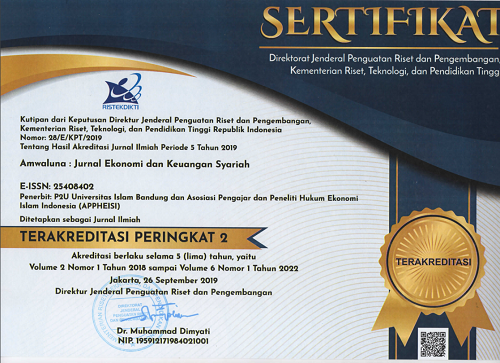POTENTIALS OF IMPLEMENTATION OF SHARIA PRINCIPLES IN THE TOURISM SECTOR OF BATU CITY,EAST JAVA
Abstract
The main objective of this research is to see the potential that supports the implementation of sharia principles in the Batu City tourism sector. The tourism sector studied consists of hotels, restaurants and food, travel agencies and tourist areas. The next objective is to see the economic benefits that will be produced in the future with the application of sharia principles in the tourism sector. This study uses descriptive qualitative methods conducted by interviews, observations and questionnaire tools to see the response generated through a Likert scale. The results of this study indicate that parties related to the tourism sector provide a positive response to the application of sharia principles in the tourism sector, which will provide economic benefits for industry players, the public, and the government.
Keywords
Full Text:
PDFReferences
Andriani, Early . (2015). Sharia Tourism Development Study . Final Report of the 2015 Ministry of Tourism's Tourism and Development Institutional Deputy.
Arjana, I Gus ti Good. (2015). Tourism Geography and Creative Economy .Jakarta: Rajawali Press.
Batkot.bps.go.id
Chookaew, S., Chanin, O., Charatarawat , J., Srip rasert, P., & Nimpaya, S. (2015). Increasing Halal Tourism Potential at Andaman Gulf. Journal of Economics, Business and Management, III (7), 277-279.
Crescent Rating. (2015). Muslim / Halal Travel Ma rket: Basic Concepts, Terms and Definitions. Singapore ore: Crescent Rating.
Council of National Sharia-Majelis Ulama Indonesia.(2016). Guidelines for Organizing Tourism Based on Sharia Principles No: 108 / DSN-MUI / X / 2016.
El-Gohary, Egyp t H. (2016). Halal tourism, is it really Halal ? Tourism Management Perspectives 19 (124-130). Faculty of Business , Law and Social Sciences. University Busine ss School. Cairo University.
Halim, Abdul. (2004). Regional Financial Management . Yogyakarta
Islah, Muainaul. (2018). The Influence of the Number of Visitors and Returns (Traders) of Sunan Giri Religious Tourism Area on Revenue.
Jonathan, Sarwono. (2006). Methods Quantitative and Qualitative Research. Yogyakarta: Graha Science.
Marzuki, SZS, Hall, CM, & Ballantine, PW (2014). Measurement of Restaurant Manager Expectations Toward Halal Certification Using Factor and Cluster Analysis . Procedia Social and Behavioral Sciences , Vol. 121
Monroe, Myles. (2011). Purpose For Living . Indonesia: Andi Publisher.
Ni Lu Ge de, Ana Pratiwi. (2014). The Effect of Tourist Visits, Tourist Attraction Objects and PHR on Regional Original Revenue (PAD) of Gianyar Regency. E-journal Economic development. Vol 3, No.3.
Organization of Islamic Cooperation. (2017) . Statistical, Economic and Social Research and Training Center for Islamic Countries (SESRIC). Strat egic Roadmap For Development Of Islamic Tourism In OIC Member Countries
Puad, Ahmad . (2016). Successful Management of Shariah Compliant Accommodation Sector in Malaysia. World Applied Sciences Journal 34 (12): 1876-1881. Fac ulty of Applied Social Sciences. Sultan Zainal Abidin University , Malaysia. College of Tourism, Rikkyo University, Japan. sp2010.bps.go.id
Samori, Zakiah . (2016). Review of Current Tr ends On Halal Tourism: Cases On
Selected Asian Countries . 19 (2016) 131–136. Department of Business Administration. Faculty of Management. Academy of Conte mporary Islamic Studies (ACIS). Malaysia: Universiti T MARA technology
Sugiyono (2012). Met ode Research Quantitative, Qualitative, and R & D. Bandung: Alfabeta.
Sugiyono (2013). Methods Pen upbringing Quantitative Approach, Qualitative and R & D . Bandung: Alfabeta.
Yoeti, Oka A. (2008). Tourism Economics: Industry, Information and Implementation . Jakarta: Kompas.
Yin, Robert K. (2014). Case Study Research Design and Methods (5 th ed .) Thousand Oaks , CA Sage.
DOI: https://doi.org/10.29313/amwaluna.v4i1.5294
Refbacks
- There are currently no refbacks.
Editorial Office:
Syariah Faculty, Universitas Islam Bandung
Jalan Tamansari No. 24-26 Kota Bandung

Amwaluna : Jurnal Ekonomi dan Keuangan Syariah is licensed under a Creative Commons Attribution-NonCommercial-ShareAlike 4.0 International License.







